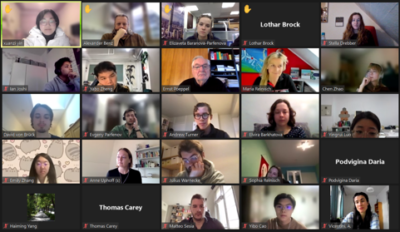“How to achieve Balanced Sustainability in a Changing World?” was the main question of the Autumn School 2022. Organized by the VDW and hosted by the LMU Munich, the international Autumn School welcomed participants from 15 countries and many more areas of expertise, to discuss how we can shape the future of our world in a sustainable way.
Before the participants started their own research, they received input from various experienced experts in sustainability. The first inputs laid the groundwork from a natural sciences perspective. Prof. Hartmut Graßl and Prof. Josef Settele focused on climate change and biodiversity. The next part included an insight on hands-on projects from different fields. Prof. Jan-Heiner Küpper explained his research on innovative CO2 reuse with the superfood Spirulina. Prof. Elke Pahl-Weber gave insights on city planning and how to build cities for the future and Dr. Maria Reinisch focused on the problem of energy supply, highlighting new ways of energy transition. Soni Joshi and Prof. Michael von Brück continued with the social aspects of transformation and mindfulness, crucial for the success of sustainability projects. Dr. Liya Yu, Prof. Ernst Pöppel and Prof. Lothar Brock finished the inputs with excursions in the fields of Neuropolitics, brain research and utopian outlooks for a peaceful future. These inputs provided extensive information on the broad spectrum of sustainability and initial ideas for the following group work.
In the second block of the Autumn School, the participants were able to demonstrate their own knowledge and creativity. In international and interdisciplinary groups of three people each, the students worked on potential solutions and approaches for a sustainable future. The projects had a scientific as well as a practical claim and the findings were presented to the other groups and the experts in the last block of the Autumn School. Each presentation was discussed intensively, by the other participants, but also by the experts who provided the input for the group work at the beginning. Many of the students‘ approaches related to human behavior and attitudes toward climate change, sustainability, and resource conservation. Many asked themselves the question: Why do people act as they do now, although they have a concrete knowledge of climate change and the dangers it entails? And what can be done to bring about a change in people’s way of thinking? Even though the questions and identified struggles of our society were similar, the approaches to finding solutions reached from a focus on social norms or intercultural communication to research in clinical psychology, ideas about the Metaverse or the inclusion of indigenous knowledge.
Through its internationality, interdisciplinarity and especially the intensive discussions, the Autumn School was a huge success. The participants-projects are being transformed into papers by the end of January and are to be published. Similar projects are planned for the future, to bring people from different geographical, academic and generational backgrounds together and find sustainable solutions for the future of our changing world.
